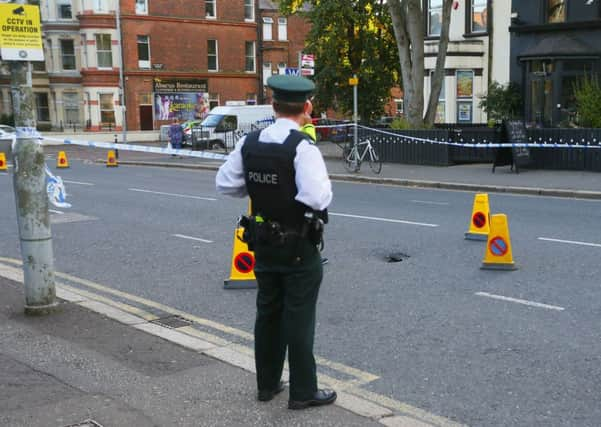Leaky pipe or sewer most likely caused Belfast sink-hole


The subsidence occurred on the heavily-trafficked Malone Road, south Belfast, and led to the closure of the street whilst workmen investigated the cause.
It manifested itself as a small hole on the surface.
Workers then excavated the area, and filled it in.
The road was opened to traffic by 8pm on Monday.
The Geological Survey of Northern Ireland (GSNI), part of Stormont’s Department of the Economy, has offered an assessment of what may have been behind the incident.
Advertisement
Hide AdAdvertisement
Hide AdDr Mark Cooper, GSNI chief geologist, said: “We produce maps and look after ground investigation records that allow us to say what materials or hazards might be expected in a particular area.
“In the Malone Road area these geological information sources tell us that below the man-made road surface there is soft loose sand.
“These sands are susceptible to being washed away if, for example, a water main or sewer leaks, which is most likely the case here.
“Such incidents are unlikely to be life threatening.
“They can, however, cause disruption to traffic and even services including water.
Advertisement
Hide AdAdvertisement
Hide Ad“Heavy rainfall events are becoming more frequent and are placing increased pressure on Northern Ireland’s underground network of services.”
He said that, as such, it is important to “build future resilience into our cities and towns”.
In 2014, holes were discovered under the Ravenhill Road, east Belfast, whilst workers were installing a new sewer line.
On that occasion, more than 200ft of roadway was affected.
NI Water had said that was caused by the collapse of a Victorian-era sewer.
Advertisement
Hide AdAdvertisement
Hide AdThe Met Office has stated that climate change means that “rainfall extremes are generally projected to increase, particularly during winter,” with summer events being more unpredictable.
Meanwhile Ray McGrath, head of research at the Met Office’s Irish equivalent, Met Eireann, has previously stated: “I’d say the likelihood is of more extreme weather; say for example with heavy downpours of rain, and flooding.”